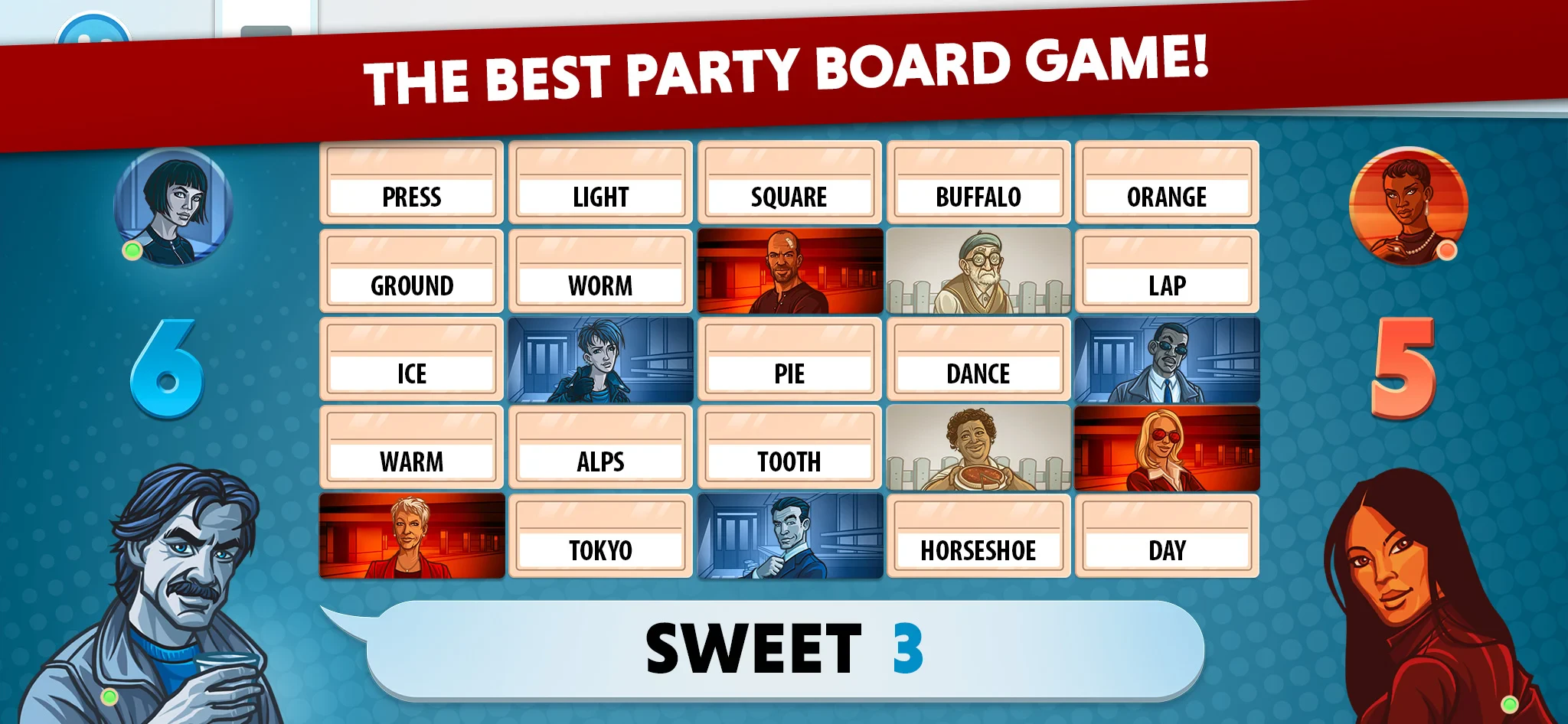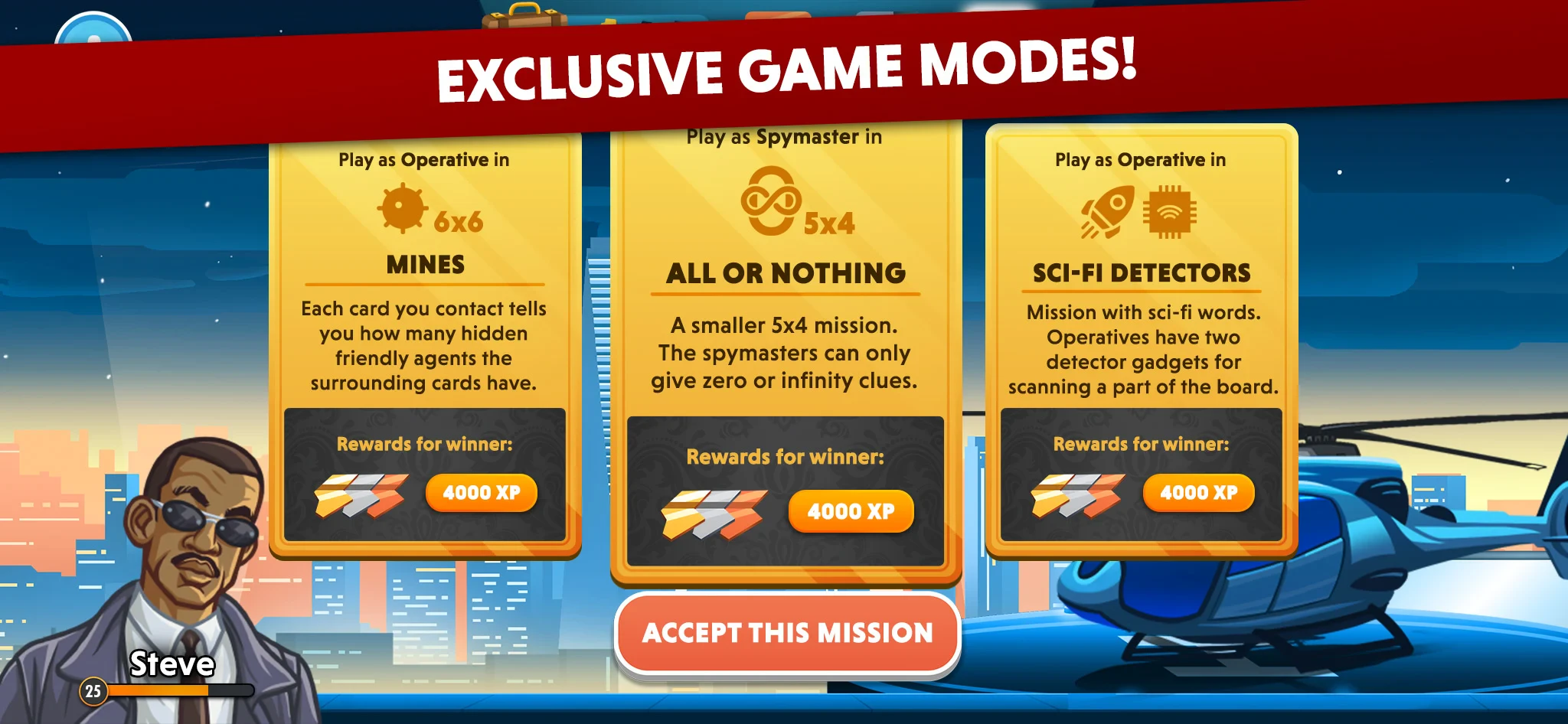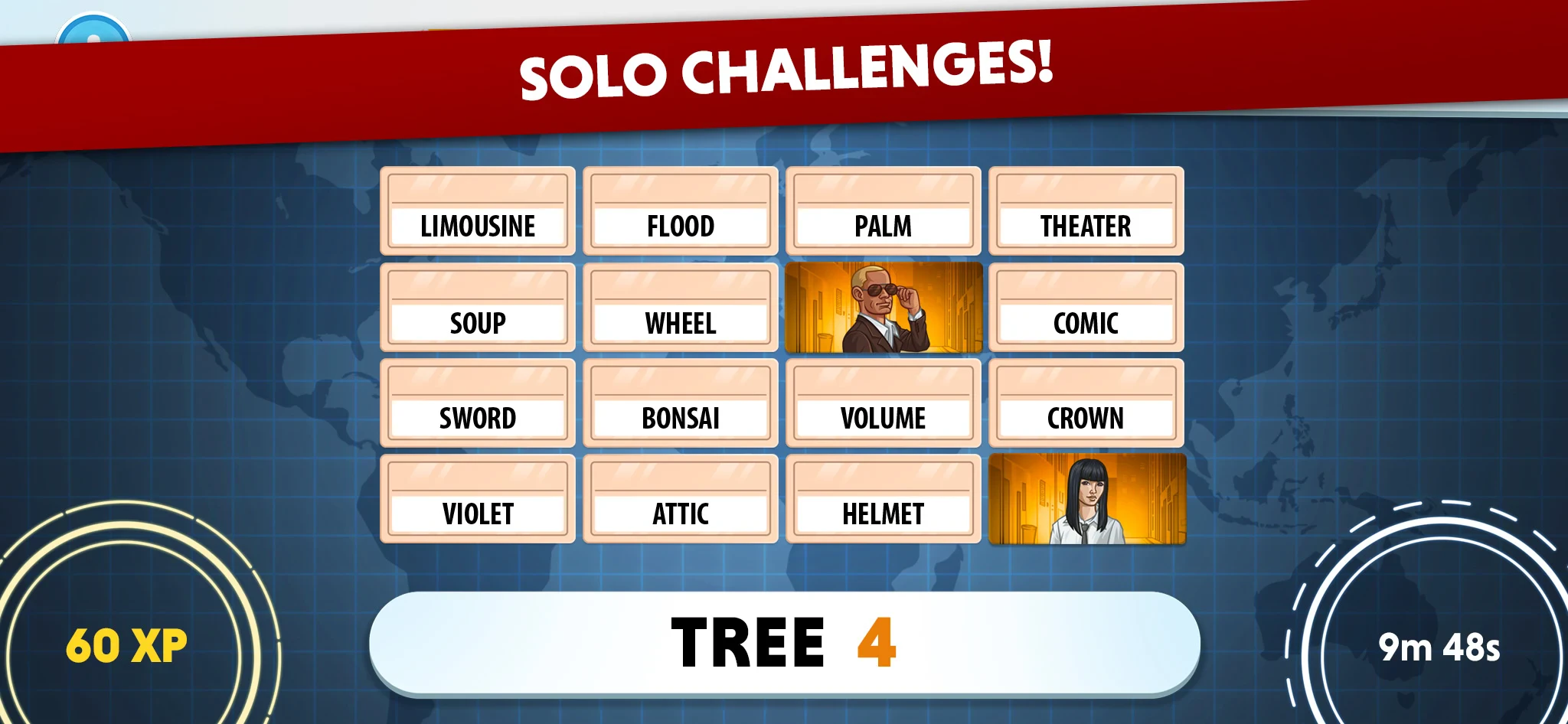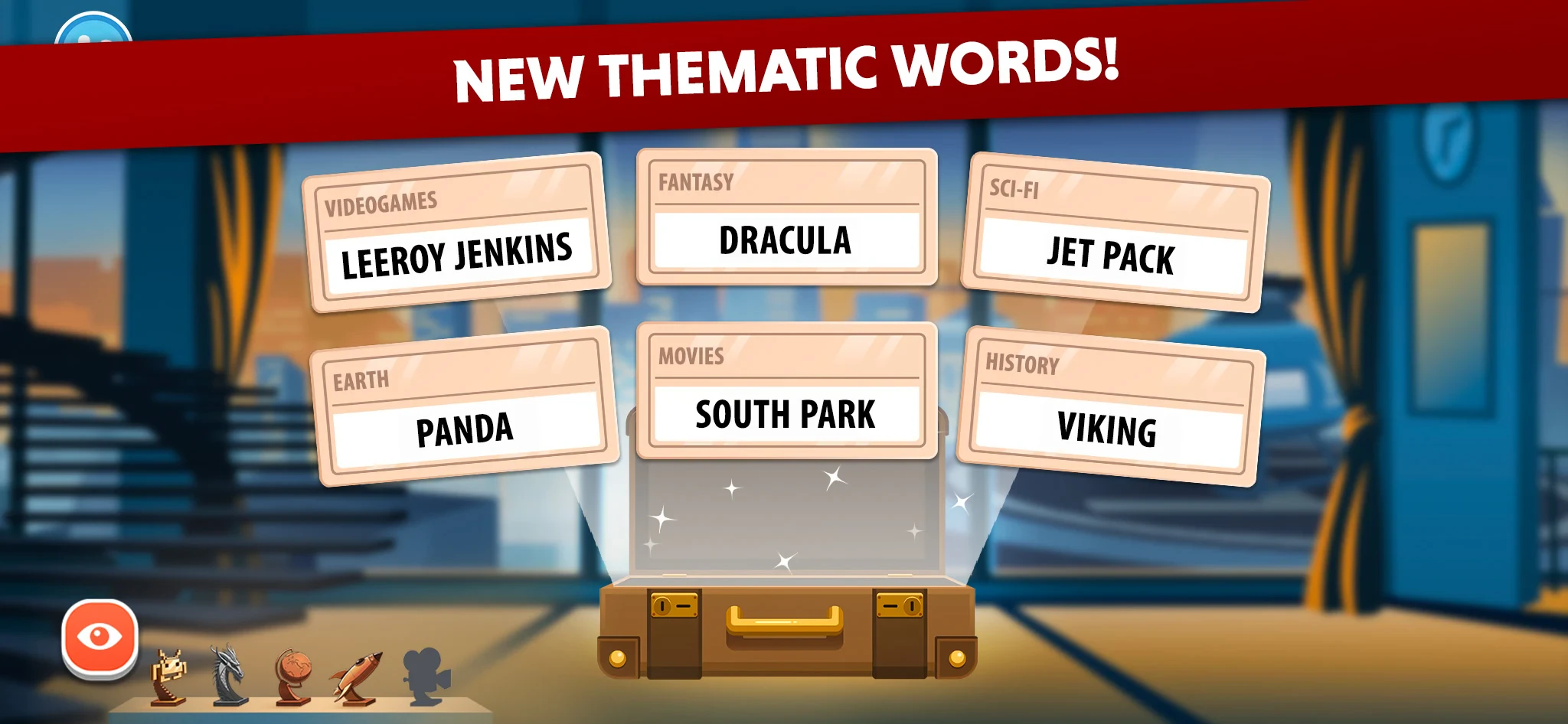 |
|
| Rating: 4.8 | Downloads: 10,000+ |
| Category: Puzzle | Offer by: CGE digital |
“Codenames” is a team-based deduction word game where players use cryptic clues given by one player (the ‘Narrator’) to help their team select the correct secret words hidden within a larger grid of common words. It belongs to the puzzle or party game genre. The game’s appeal lies in its simple rules, fast-paced rounds, and the clever wordplay required, as players must avoid selecting opposing words (‘Codenames reds’).
Playing “Codenames” offers a quick and engaging team experience, often fitting perfectly for social gatherings, pub quizzes, or short breaks. The visual style is minimalistic, relying almost entirely on the printed grid and players’ interpretations, focusing the fun squarely on the strategic word association and deduction process.
Gameplay and Features
- [Core Gameplay Loop]: The main mechanic involves a secret word list (codenames) displayed alongside a general list of common words forming a grid. One player reads out clues to help their team identify which common words to click as pointers leading to the secret codenames. The objective for each team is to correctly claim all their assigned codenames before the opposing team does.
- [Visuals or Art Style]: The visuals are straightforward, typically featuring a grid layout on cards or screens with different colours for codenames (often red/blue) and other words (common or hazard words, usually white/brown). The design focuses on readability.
- [Modes or Levels]: Traditionally designed for small groups around a physical board, it can also be played online. Difficulty increases naturally with more codenames or larger grids. Single or party play is common, enhancing replayability through different word lists and competitive vs. cooperative play against friends.
- [Controls or Interface]: Gameplay is dictated by the ‘Narrator’ who gives one-word clues, and the other team responds by selecting adjacent words they believe relate. In digital versions, this might involve tapping or clicking interface elements; in traditional play, it’s verbal declarations and pointer selections.
- [Customization or Power-ups]: Customization mainly involves using different word sets that provide varied thematic challenges. There are generally no power-ups or in-game progression systems; the motivation for ongoing play comes from mastering word connections, enjoying friendly competition, and exploring diverse content packs.
- [Any Special Systems]: Some versions, like in the mobile app, include features like replaying games with free friends, built-in AI opponents, and expanding word packs. Certain tables might even have a ‘Codenames: Deadlock’ variant where both teams cooperate to escape the seemingly one-word solution grid.
How to Play
Beginner’s Guide:
- Step 1: Find a team (traditionally 4 people per side). Either buy or download the game easily and set up the board (physical or digital). One player is designated as the Narrator.
- Step 2: A grid of words appears, with some designated as ‘Codenames’ (usually colour-coded blue for your team, red for the opponent(s)), and others as ‘pointer’ or ‘trap’ words. The Narrator has a list of secret codenames for their team.
- Step 3: The Narrator reads out a one-word clue relevant to one or more of their team’s codenames. The opposing team tries to guess one codename using that clue. If correct, it is marked and everyone takes a turn until all codenames are claimed or a time limit expires.
Pro Tips:
- Think broadly!: Focus on common associations, not just direct synonyms or definitions. Useful tips include playing with friends, being quick but accurate, and paying attention to all words in the list. Always get a clear yes/no before declaring a word, even if it seems intuitive.
- Build Category Chains: Recognize thematic groups (e.g., ‘doctor’ -> ‘stethoscope’ -> ‘hospital’) cues. Use advanced or free word sets available online for different themes if playing digitally.
- Be Uniquely Frank: Help your team win by using concise hints that don’t overshare, even if you accidentally give away a word. Always read the rules carefully before starting a new game.
Similar Games
| Game Title | Why It’s Similar |
|---|---|
| Spelling Bee |
Also involves finding words in a set of letters with a thematic twist and provides a unique challenge. Known for detailed word validation and daily puzzles. |
| Pictionary |
A social deduction game heavily reliant on visual art and wordplay, appealing to large groups and offering immediate competitive fun. |
| NYT Connections |
A puzzle game from a major newspaper website focusing on finding groups of four words sharing a theme, mirroring puzzly deduction, though executed differently. |
| Words With Friends |
Another classic board/pocket word game with connecting pieces or letters, evoking classic arcade feel often using touch controls, despite a different core focus. |
Frequently Asked Questions
Q: Is “Codenames” best played on a phone, PC, or board game setup? Which Codenames phone app offers the most unique tables or word packs?
A: “Codenames” can be successfully enjoyed on phones (e.g., the official DDNK app is highly recommended for its variety and style) or PCs, and there’s even a physical board version. What truly sets a table apart is often the specific set of “secret Codenames” available, though platform availability varies.
Q: How many people does “Codenames” typically accommodate, and do I need to have an odd number of players for a game?
A: A standard “Codenames” game usually requires a Narrator and two teams. With cards, four or more players are ideal. Online/mobile versions often allow for settings with more flexibility. An odd number might need combining teams or finding more players.
Q: Is it acceptable to guess a Codename and penalized if I’m wrong? Can I clarify or change a guess before finalizing it? Should I ever guess a Codename word directly as a pointer?
A: If unsure, it’s generally better to abstain or ask for clarification in live play, but guesses on pointers can be made tentatively. While correct guesses are encouraged, incorrect pointers lead to points for the opposing team. Directly guessing a Codename word (trying to nab it in one sweep) is usually considered a clever niche strategy, but minimizing traps often yields the best score.
Q: Which Codenames multilayer tables or story modes offer the biggest challenge linguistically, including difficult words or themes? Is there an app offering bonus packs focused on niche topics like historical figures or scientific terminology?
A: Complexity often depends on the specific table or game version; many Codenames tables offer thematic word sets with varied difficulty levels. Yes, numerous Codenames apps frequently include special themed packs (e.g., historical, presidents, idioms) which can provide significant linguistic challenges beyond basic English proficiency.
Q: How does the “Codenames” audio difficulty audio mode function, where one player whispers a hint? Are harder tables in physical vs app versions significantly different in their word choices or scoring mechanics?
A: The audio mode lets one player hear a whispered clue while others identify the codename, adding a layer of auditory deduction. Difficulty adjustments often happen dynamically based on score or selection history in both physical (competitive play) and digital (configurable levels) Codenames games, using word sets designed for varying audience familiarity.
Q: Is the Codenames PC or online version typically free to play with potentially microtransactions, or does the mobile app include its own cost with paid expansion packs? Does this affect the core gameplay loop of claiming words?
A: Availability differs. Official and third-party Codenames apps often start free or have varying models (some free, others paid). Mobile surcharges may apply. Microtransactions or paid packs might expand word banks, but generally avoid altering the fundamental deduction focus of the core “Codenames” gameplay loop.
Screenshots
 |
 |
 |
 |
